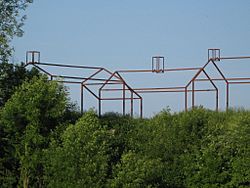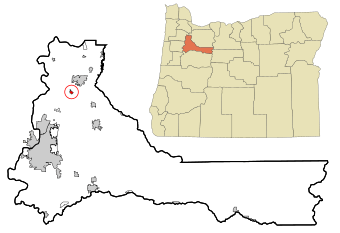Willamette Mission State Park facts for kids
Quick facts for kids Willamette Mission State Park |
|
|---|---|
|
Lone Tree Bar State Park |
|

A "ghost structure" marks the location of the mission
|
|
| Lua error in Module:Location_map at line 420: attempt to index field 'wikibase' (a nil value). | |
| Type | Public, state |
| Location | Marion County, Oregon |
| Nearest city | Gervais |
| Area | 1,680 acres (680 ha) |
| Created | October 6, 1834 |
| Founder | Rev. Jason Lee |
| Operated by | Oregon Parks and Recreation Department |
| Visitors | ~280,000 |
| Status | Open all year |
| Designated | May 24, 1982 |
|
Willamette Station Site, Methodist Mission in Oregon
|
|

City of Gervias, Oregon - Marion County
|
|
| Area | ~6 Acres |
| Built | 1834-1836 |
| Architect | Rev. Jason Lee, Missionary |
| Architectural style | Un-hewn log Wood slab-lap roof |
| NRHP reference No. | 84003040 |
| Added to NRHP | August 1, 1984 |
Willamette Mission State Park is a fun place to visit in Oregon. It is a state park located near the Willamette River. This park is about four miles (6 km) north of Keizer. It is also close to the Wheatland Ferry.
The park is special because it holds a historic site. This site is called the Willamette Station Site, Methodist Mission in Oregon. It is listed on the National Register of Historic Places. This means it is an important historical spot in the United States.
Contents
History of Willamette Mission Park
This park is where the Willamette Mission was first built. A person named Jason Lee started it in 1834. He came to the Oregon Country to teach Native Americans about Christianity.
Early Buildings at Mission Bottom
The first missionaries built a simple one-room house. This house was used for many things. It was a school, a church, a hospital, and a place to live. Later, they made the house bigger. They also built a barn.
In September 1837, more missionaries arrived. They built even more structures. These included a blacksmith shop and a granary. They also built another building that was both a school and a dining hall. This growing settlement became known as Mission Bottom.
Moving the Mission and a Big Flood
The mission later moved in 1840. It moved to a place called Chemeketa, which is now Salem.
In 1861, a big flood happened. The flood caused a lot of damage to the old mission site. The Willamette River even changed its path because of the flood. Today, a special "ghost structure" shows where the mission once stood. This helps visitors imagine the original buildings.
What to See and Do at the Park
Willamette Mission State Park is a large park. It covers about 1,680 acres (6.8 km²). It is located along the east side of the Willamette River.
Hiking Trails and Nature
The park has many trails for hiking. There are about eight miles (13 km) of trails. These trails follow along the river. They are great for exploring nature and getting some exercise.
The park is also home to a very special tree. It has what might be the largest black cottonwood tree in the United States. This huge tree is called the Willamette Mission Cottonwood. It has been named an Oregon Heritage Tree. This means it is a very important tree to Oregon's history and nature.
 | Janet Taylor Pickett |
 | Synthia Saint James |
 | Howardena Pindell |
 | Faith Ringgold |

